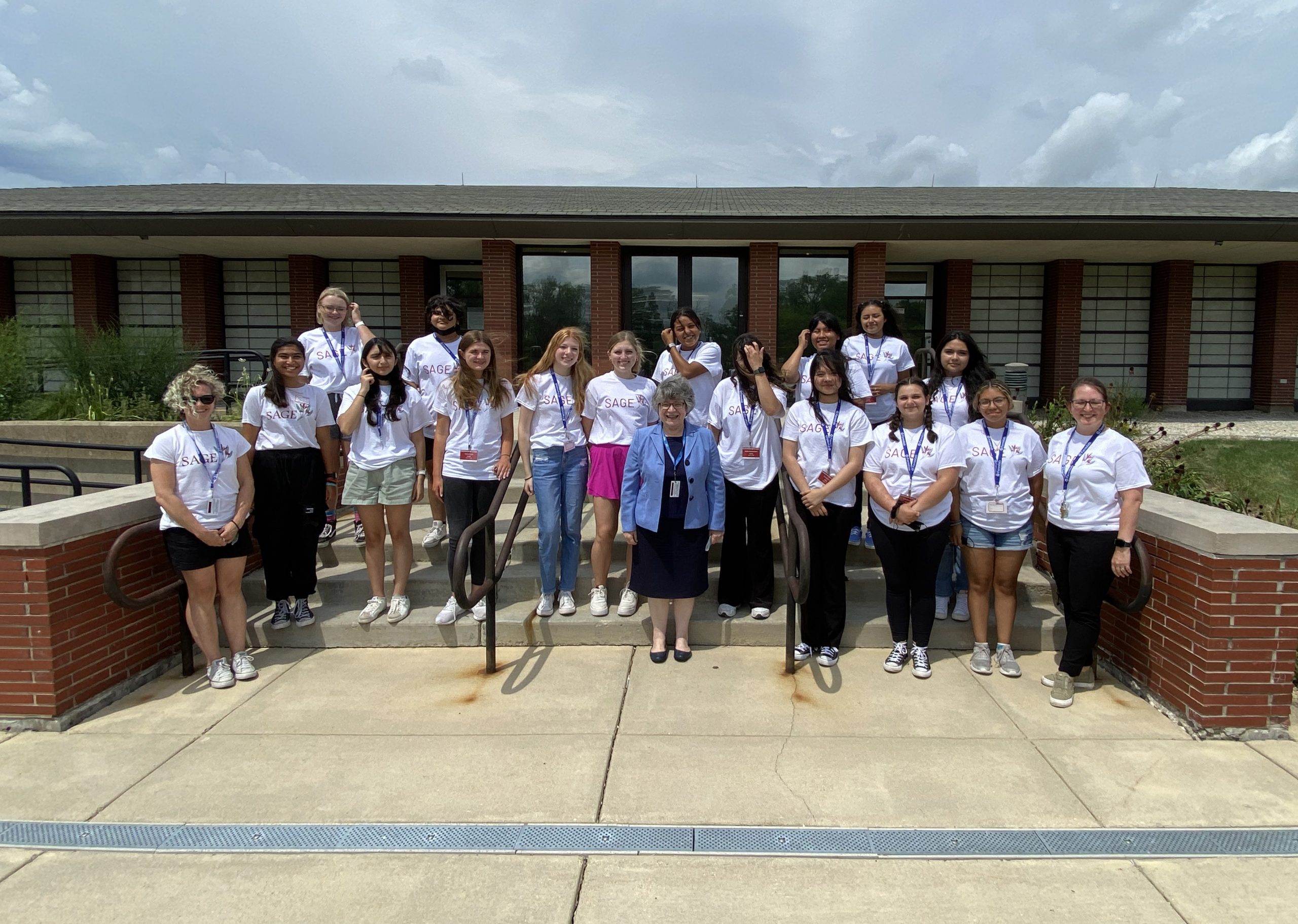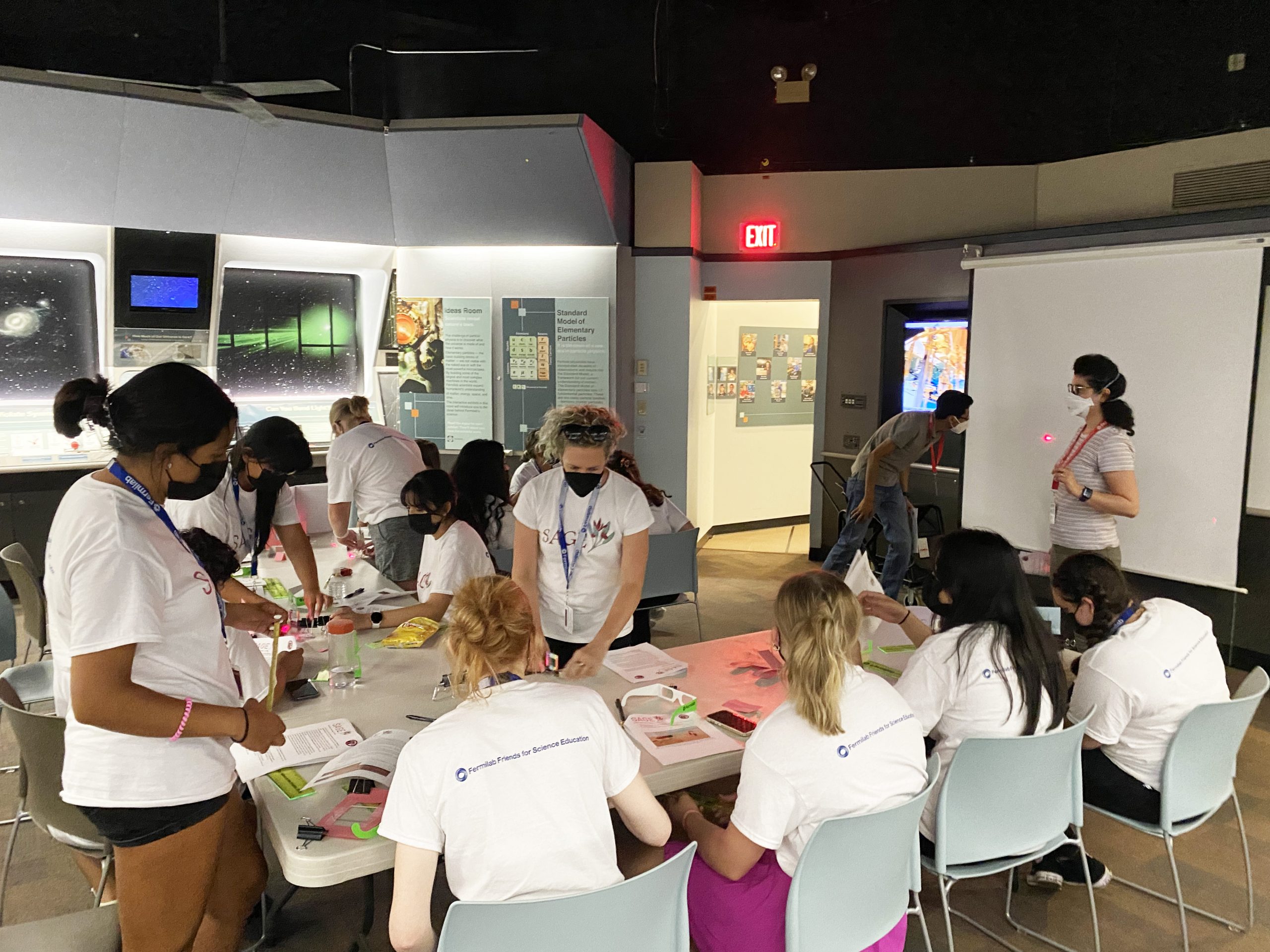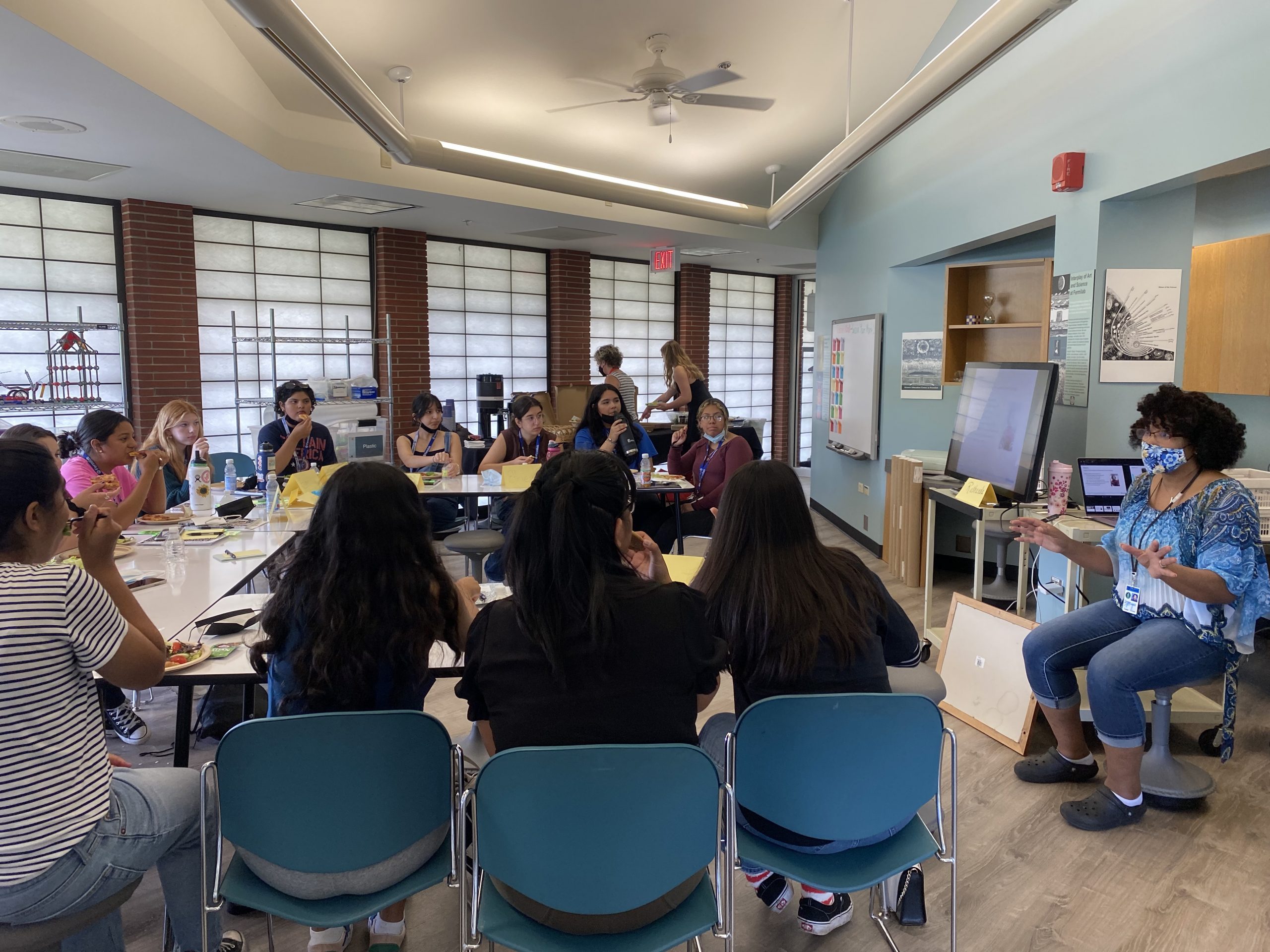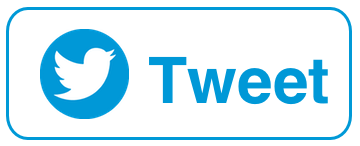In the first week of August 2022, 15 young women boarded two small buses to take them from their high school in West Chicago, Illinois, to the U.S. Department of Energy’s Fermi National Accelerator Laboratory’s first-ever, week-long summer program for girls.
Science Accelerating Girls’ Engagement in STEM, commonly known as SAGE, is a program designed to inspire curious young women and non-binary high school students who may have an interest in science, technology, engineering or mathematics. SAGE provides high school girls the opportunity to connect with professional leaders to learn about potential career paths through activities, discussions, lab tours and career talks.
“SAGE was created to inspire and facilitate the growth of young girls interested in STEM,” said Lia Merminga, director of Fermilab, who founded SAGE when she worked at SLAC National Accelerator Laboratory. “This is the place where young girls can develop the confidence in themselves and their abilities to follow their dreams.”

Fermilab’s first group of SAGE participants stand with Jen Raaf, co-PI of SAGE at Fermilab; Aman-da Early, former co-PI of SAGE; and Fermilab Director Lia Merminga outside the Lederman Science Center. Photo: Amanda Early, Fermilab
Upon arriving at the Lederman Science Center on Fermilab’s campus, the students, who ranged between the ages of 15 and 18, found themselves engaging and collaborating with each other in small groups on activities that introduced them to diffraction patterns, gravitational lensing, the photoelectric effect and quantization.
“It took us half the available time to go through the exercises, and that was a great way to break the ice,” said David Pushka, SAGE volunteer and engineer at Fermilab. “Then we started to talk about things beyond the SAGE agenda that the students were most interested in, and that was the best part.”
Pushka was one of the many volunteers who participated in this program for the first time at Fermilab, which he said was a rewarding experience for both volunteers and participants.
Bringing SAGE to Fermilab
Fermilab scientist Jennifer Raaf, upon hearing a presentation about the SAGE program by its organizers at SLAC National Accelerator Laboratory, began exploring what would be involved in expanding the program to Fermilab. In speaking with colleagues and leaders at the lab, she garnered support for the idea, which gained momentum and came to fruition the summer of 2022.

Jen Raaf, co-PI of SAGE at Fermilab, works with some of the girls in Lederman Science Center’s Ideas Room during the camp. Photo: Amanda Early, Fermilab
In the midst of establishing the program at the lab, Raaf and her team contacted science teachers in two local schools with a primarily large population of underrepresented students to have them encourage their students to apply to the program.
Because Fermilab was the sixth national lab to establish the camp, the program went smoothly for its first year. Previously, the camp at SLAC was virtual, which enabled Raaf and a few other Fermilab staff to volunteer and gather insight into how to engage with the girls and what to expect from the camp.
Fermilab provides numerous opportunities to explore STEM fields as potential careers, from high school and undergraduate internships to programs for military veterans. The SAGE camp further complements the existing programs by providing opportunities for a particular segment of the student population.
“SAGE was created to inspire and facilitate the growth of young girls interested in STEM. This is the place where young girls can develop the confidence in themselves and their abilities to follow their dreams.” – Lia Merminga, founder of SAGE
“It was so great to be able to do this in person at Fermilab — both for the camp attendees and for the volunteers who helped make the camp possible,” said Raaf. “Our volunteers enthusiastically donated their time … It was rewarding to see how that enthusiasm was infectious.
“By the end of the camp, the students were so excited,” she said. “I hope it means that we’ve opened some minds to future paths they hadn’t previously considered!”
Throughout the week, the girls had the chance to take multiple interactive tours of Fermilab’s storied labs and listen to career talks, one of which was given by Lia Merminga and another by Roshanda Spillers, a computing associate for the accelerator department at Fermilab. In Spillers’ talk, she displayed a digitally made poster containing a visual representation of her dreams and goals that helped guide her in her life. As she showcased her framed poster of her aspirations, strengths and weaknesses, she reminded the girls to listen to themselves and be fearless.
“I wanted to show the girls that there are people just like them working in the lab,” said Spillers. “In spite of what people think or say who they are, know who you are and know your self-truth. Sometimes you need to support yourself when others don’t.”
Embarking on the SAGE journey
What is now a program for which many volunteers will be returning, SAGE at Fermilab provides young girls, specifically minorities, the opportunity to dip their toes into physics or the field of science as a whole. More than just a summer camp, Raaf said, SAGE is a journey that allows girls to make connections at the lab, gain exposure to various branches in science, and the support to achieve these goals.

Roshanda Spillers, an accelerator electronic technician at Fermilab, gives a career talk to the 15 SAGE participants. Photo: Amanda Early, Fermilab
Mainly designed as a week-long summer camp at the six national labs, the national SAGE program also offers a few live professional growth workshops throughout the year. Some of them work on resumé-writing and interviews, while others talk about the program’s internships and re-connect camp alumni.
SAGE at Fermilab looks to continue this summer with more girls, more volunteers and even more spirit.
“Our present-day complex and challenging scientific and societal problems require diverse, multi-faceted perspectives to solve. Women bring creativity, insights, collaboration and much more to the STEM disciplines. Girls should feel empowered to pursue their aspirations,” said Merminga. “If science is what they want to do, the sky’s the limit.”
Fermi National Accelerator Laboratory is supported by the Office of Science of the U.S. Department of Energy. The Office of Science is the single largest supporter of basic research in the physical sciences in the United States and is working to address some of the most pressing challenges of our time. For more information, please visit science.energy.gov.



